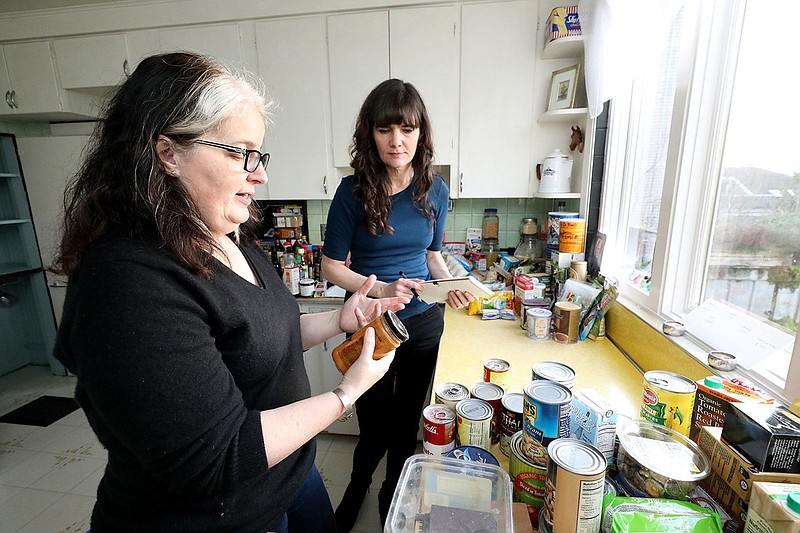SEATTLE-It was a lot worse than I thought.
A food writer's pantry ought to be an orderly place, neat and tidy and carefully "curated." Watching Marie Kondo's hit Netflix series "Tidying Up," I realized this just might be a bit of a problem for me. But the show felt more fascinating and soothing than inspiring.
Until the last episode, that is, when Kondo declared in the course of a kitchen purging that anything past the expiration date should be thrown out. I could pretty much hear Seattle food-waste expert Jill Lightner's head exploding. What if we Kondo'd my kitchen together, also deploying Lightner's encyclopedic knowledge of what's really still all right to eat-or donate to a food bank? (And what about composting?!)
So, on a recent afternoon, in accordance with Kondo's organizational method, Lightner and I disgorged the contents of the larder onto the kitchen counter for sorting. Kondo would've been clapping her hands with glee ("I love mess!").
But what truly doesn't spark joy for Lightner is the amount of food that our country squanders while some go hungry-an estimated $1,500-plus worth per household annually. It troubles her so much, she recently wrote a book about it: "Scraps, Peels, and Stems: Recipes and Tips for Rethinking Food Waste at Home." Kondo's dictate that anything past the expiration or best-by date should be tossed (after, of course, ceremonially thanking it) is anathema to her. "I have a grudge against date stamps," Lightner said before we got started, "because most of them are bulls***." Baby formula's the only food in the U.S. that's legally required to bear a date; the rest are not set in stone, but rather by manufacturers who want to sell more food.
But what, exactly, is safe to keep-or, if it's going to continue languishing unused, OK to donate to the food bank? Lightner-kind yet ruthless, funny and all-food-knowing-was here to help.
"Having a chocolate grand piano is amazing," Lightner said as we contemplated a miniature one in a plastic box. It came from a fancy restaurant I reviewed, um, quite some time ago. Who can bring themselves to eat a chocolate grand piano?
We ended up leaving the specific-to-me Sentimental Food category for my later wrestling. Lightner's dispensation on the rest of it was invaluable-and here we go:
Dried pasta will stay in perfect condition for years. Dried egg pasta, however, may develop off flavors after 18 months, while whole-wheat pasta has oils in it that can get rancid. The bounty uncovered from my cupboards wasn't even that old, just the product of picking up extra on sale, then stowing the packages in two different spots.
Canned goods can also last almost indefinitely, if "the can isn't doing anything creepy" like swelling, Lightner said (and she's never actually witnessed that). Stuff that relies a lot on texture will eventually degrade, however. Canned goods you're not getting to are generally welcomed by the food bank.
Vinegar never goes bad. But, Lightner said, the taste of aged vinegars, like some balsamic ones, will begin to change with time-she counseled me to donate some of my unopened supply to the food bank, which I was very happy to do.
Oils eventually get rancid. Smell them-you'll know.
Condiments and sauces have varying life spans. Stuff with lots of acidity, like hot sauce, lasts a long time, but won't be the same after the color starts to change. Stuff with lots of salt, like soy sauce, should be OK.
Sugar will always stay sweet, and salt is stalwart. Smell your flour-it should be fine unless it's absorbed other odors. The cornmeal from my cupboard had the faintest corny scent-and that's what you're looking for, according to Lightner, who suggested storing it in the fridge from now on, along with the grits, as they contain oils. Old baking powder loses its power. Old baking soda loses its fitness for baking, but can still be used to absorb odors in the fridge, unclog a sink (with vinegar) or for cleaning. Cornstarch, kept dry, will last.
More foods that will last just about forever, according to Lightner: white rice, dried beans, dried lentils, honey, tea. She also says chocolate stays good, whether in piano form or not. Same with unsweetened cocoa.
In the end, Kondo'ing my admittedly nightmare-level kitchen cupboards took less than three hours. We worked fast, only stopping to ponder important questions such as who'd bought three different kinds of tomato soup mid-Obama era.

